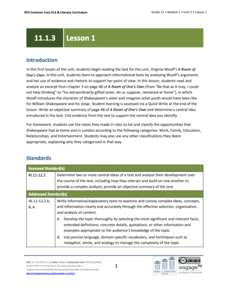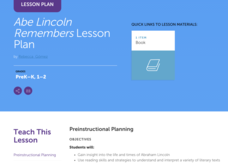Curated OER
Is It Fact or Opinion?
Distinguish between fact and opinions in this nonfiction reading lesson. Middle schoolers read 'The Diary of an Early American Boy' and work in groups to analyze the text. They record the facts and opinions for the text.
Curated OER
Comprehension: Compare and Contrast Topics in Two Texts
A scripted lesson can be a big help for new teachers. This fully scripted three-day learning activity provides teachers with the means to demonstrate how to compare and contrast two topics in two texts. Learners will work as a class to...
National Council of Teachers of English
Timelines and Texts: Motivating Students to Read Nonfiction
With the emphasis on incorporating more nonfiction in language arts classes the question arises about how to design activities that motivate kids to engage with informational text. How about an assignment that asks class members to...
EngageNY
Grade 11 ELA Module 1: Unit 3, Lesson 1
What was Shakespeare's youth like? Virginia Woolf considers the question in her nonfiction text, A Room of One's Own. Scholars begin reading Woolf's work before analyzing some of the text. Next, they write an objective summary and...
EngageNY
Connecting Literary and Informational Texts: Cronus and “The Key Elements of Mythology”
Is there a connection? Scholars work to make connections between Myth of Cronus and The Key Elements of Mythology. First, they circle important words in the text and look for similarities. They then revisit the concept of theme and...
Media Smarts
The Impact of Gender Role Stereotypes
One of three lessons on gender stereotype, this resource from the Media Awareness Network discusses the violence that is inflicted on men and women as they try to live up to the stereotypes of their gender. The section on women focuses...
Scholastic
Abe Lincoln Remembers Lesson Plan
Discover the life of Abraham Lincoln with help from the story Abe Lincoln Remembers by Ann Turner. After listening carefully, scholars reflect on what they deem as Lincoln's most influential life event and how it relates to them,...
EngageNY
Mid-Unit Assessment: Analyzing an Author’s Argument and Text Structure
William Shakespeare: a writer, a poet, a fake? For their mid-unit assessments, scholars read an excerpt from the article "The Top Ten Reasons Shakespeare Did Not Write Shakespeare" by Keir Cutler. Next, they analyze the author's argument...
Teach-nology
Author’s Purpose: Inform
Why does an author write an informative article? Learners examine passages of a short reading on Spain and determine what the author wanted to inform the reader about.
EngageNY
Grade 9 ELA Module 3, Unit 1, Lesson 9
Keeping animals relaxed and comfortable has numerous benefits. Explore Temple Grandin's unique perspective on animal behavior with a lesson that concentrates on a central idea within the text. High schoolers prepare for the final...
EngageNY
Grade 9 ELA Module 2, Unit 3, Lesson 12
As the first in a two-part, end-of-unit assessment that encourages readers to synthesize the unit's main ideas, class members review their notes for each of the three texts they read and develop three open-ended discussion questions...
EngageNY
Grade 9 ELA Module 3, Unit 1, Lesson 2
Autism isn't an illness or a disability. In the first chapter of Animals in Translation, we learn about Temple Grandin's unique ability to understand animals through her experience with autism. Having read pages four through eight for...
EngageNY
End of Unit Assessment: Drafting the Informative Consumer Guide
Not all sandwiches are edible. Scholars use a Quote Sandwich graphic organizer to draft the written content of their informative consumer guides. Additionally, they view a mini-lesson on formal writing.
EngageNY
Researching Information about Sustainable Fishing
Go fish! Scholars continue using their research skills to find factual information to use in their consumer brochures about overfishing. They work in triads to research information about sustainable fishing practices and share their...
EngageNY
Analyzing the Features of an Informative Consumer Guide
Analyze, strategize, synthesize! Scholars analyze informative consumer guides to determine what features to include in their own guides. Next, pupils select charts and images to use in their guides.
EngageNY
Mid-Unit 3 Assessment Part 1: Researching Information about Buying Fish Caught Using Sustainable Methods
Sustainable seafood is not an oxymoron. Pupils watch a video about how consumers purchase seafood responsibly. Then, using resources in their assessment research folders, they complete a graphic organizer to record factual information...
EngageNY
Grade 9 ELA Module 3, Unit 1, Lesson 4
Can dogs feel shame? Explore the anthropomorphic connection between human emotions and animal behavior—or lack thereof—with a activity about Temple Grandin's book, Animals in Translation. Ninth graders continue a close reading of chapter...
Curated OER
Abraham Lincoln and Frederick Douglass: A Compare and Contrast Lesson Plan
Two great men, one time period, and one purpose; it sounds like a movie trailer, but it's not. It's a very good comparative analysis lesson focused on Abraham Lincoln and Frederick Douglass. Learners will research and read informational...
Curated OER
Active Reading with American History
Explore connections within and between informational texts with this lesson about encyclopedia articles. Middle schoolers write encyclopedia articles focusing on topics in American history. They discuss how to determine credibility...
Curated OER
Word Up!
Study the importance of word choice in informational text. Middle and high schoolers locate unfamiliar words and phrases in newspaper articles of their choosing, and use online word sites to explore the definitions and histories of each....
Curated OER
Who Could Have Been Who
Can word choice affect a candidate's likeability? Use a New York Times lesson to explore how a presidential candidate's likeability factor can fluctuate in public opinion polls. Young readers choose a presidential election from their...
Curated OER
The Fabric of History
African-American history is an integral part of what America is. Learners examine important events, read informational texts, and create quilts depicting specific eras in African-American history. Each image created for the quilt will be...
Curated OER
The Internet of Things: IoT
How has the Internet of Things affected our lives? Scholars examine the massive influence of mobile devices in this analysis lesson, which begins with a seven-minute documentary clip. They also read a New York Times article (linked)...
Curated OER
Can Scientists Discover a Limit to Discovery?
Is there anything left to discover? Evaluate opposing sides of the debate regarding whether or not there is a future for scientific discovery. Middle and high schoolers assess quotations from the articles included to evaluate claims and...

























